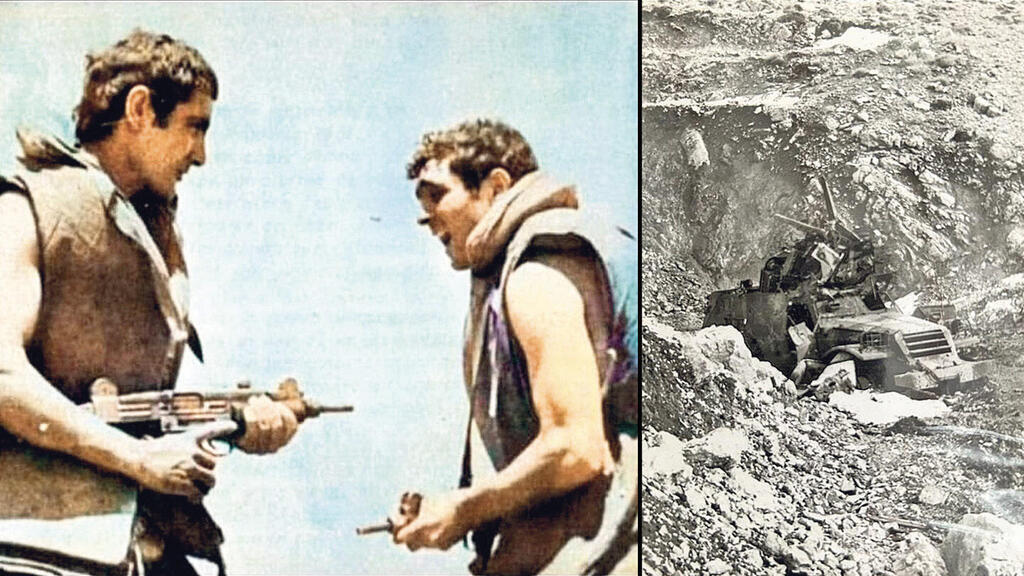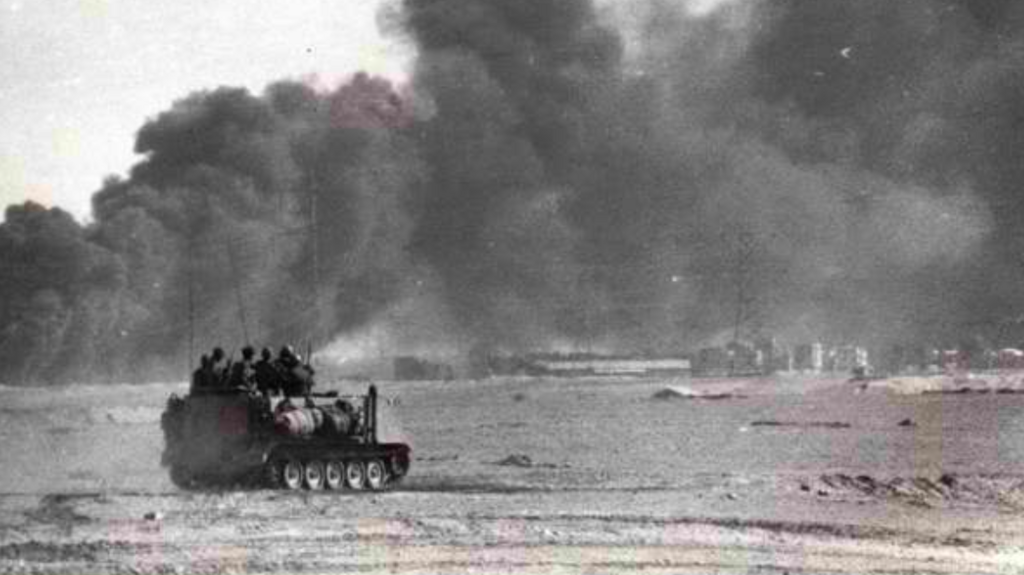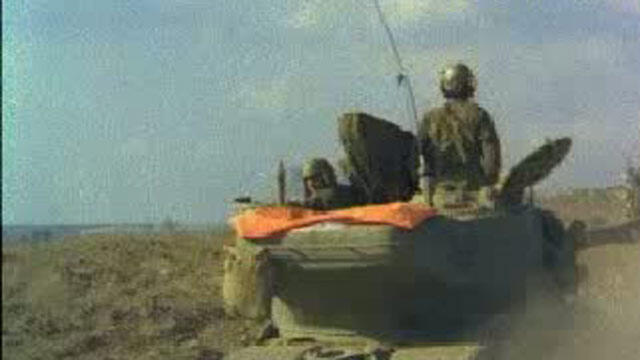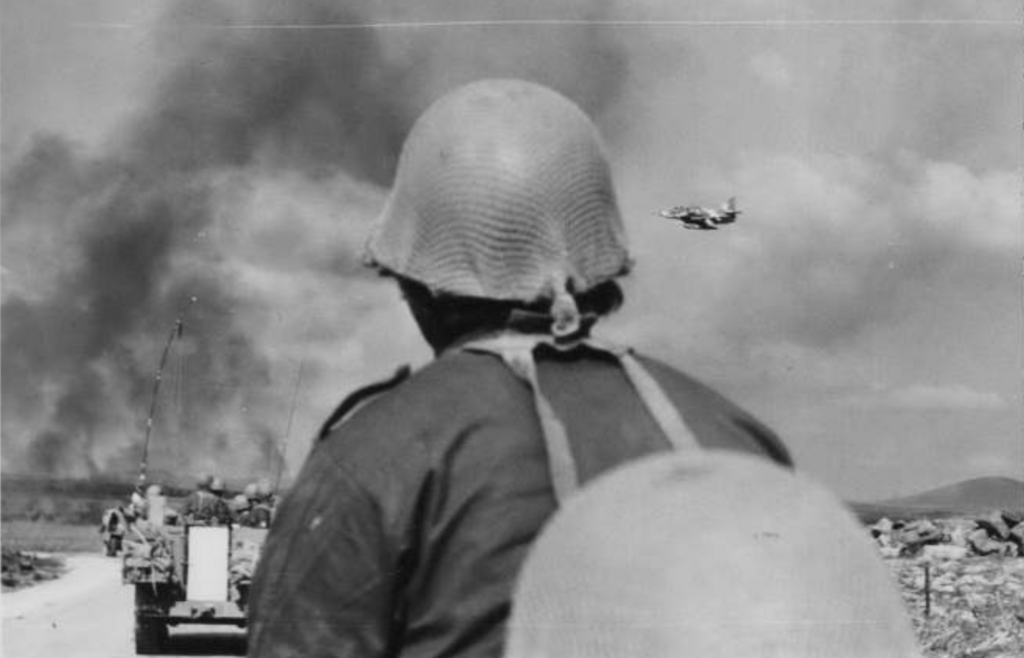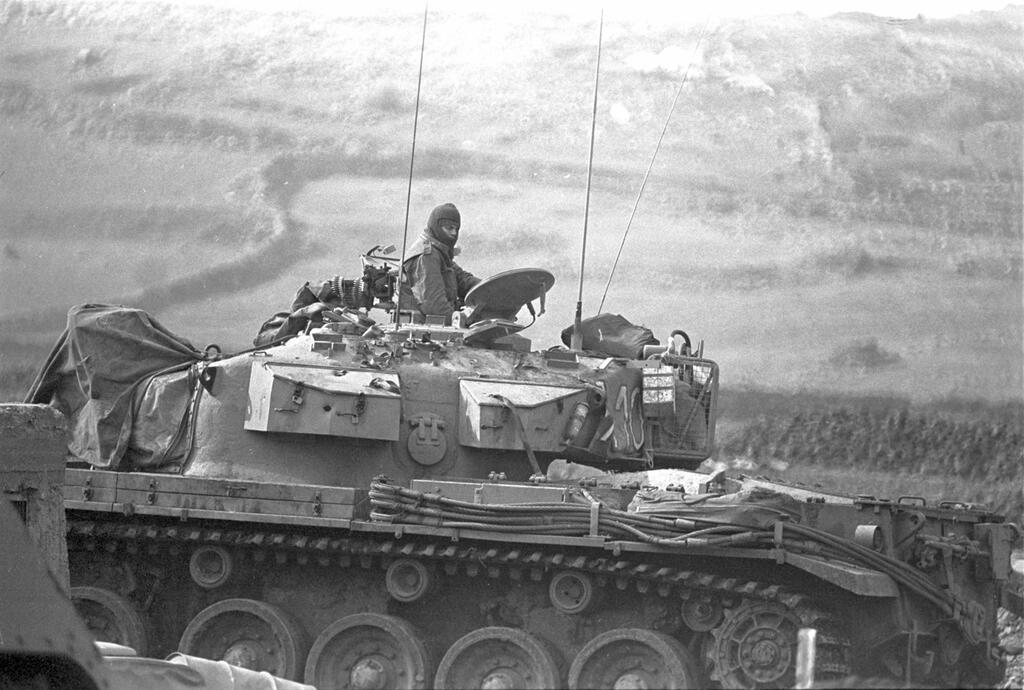Eli Mahfuda, an Israeli who has been living in the U.S. for the past 40 years, decided on this year's Memorial Day for fallen IDF soldiers to light a virtual memorial candle on the Defense Ministry's website for two of his comrades from long ago. Little did he know where his gesture would lead.
Read more:
Mahfuda wrote a few heartfelt words about his friends, Corporal Shimon Fahima and Corporal David Biton on the website. They were both killed on the Golan Heights on the first day of the Yom Kippur War. His post stirred a storm of emotions among relatives of the two fallen soldiers who have for years hoped to meet someone who was with their loved ones in their final moments.
Shimon was a funny and clever boy who loved to sing and dance, Fahima's 93-year-old mother says. "He was always keen on joining the military. At first, he wanted to be a paratrooper but because he had not graduated high school, he was posted to the Golani brigade where he found friends who became most important in his life.
"The 13th battalion was problematic," Mahfuda says. "Let's not mince words. It was made up of predominately Sephardi men who were not looking to rise in the ranks even though they were excellent soldiers. They felt that way because their commanders, who were from the affluent quarters of Tel Aviv, showed them little respect. It still hurts, even 50 years later."
Fahima's family never shared the feeling that it was marginalized and remembers Shimon always having great ambitions for the future. He insisted on rejoining his comrades in the combat unit even after he was wounded by a stray bullet and could have been stationed in a non-combat role. "He refused to be assigned a desk job and my mother is still angry that the IDF went along with his demands," his sister Rachel Keinan says.
"The family never knew he was killed"
Although he was killed on the first day of the war, his family had no knowledge of his whereabouts for two weeks. "There was nowhere to call," his sister says. "We would stop anyone we saw in uniform and ask if they had encountered Shimon. The military said that 690 families of fallen soldiers from the battle on the Golan Heights were to be informed of their deaths at the same time. The soldiers were temporarily buried in the northern city of Afula during the fighting.
"My mother announced one morning that today we would be informed about Shimon's death. We later learned that some people around us already knew what had happened but waited for the official announcement. But my mother said that if he did not write or call, he was dead. She insisted that he would have written her a note, even on the back of a matchbox if he could have.
"When word finally came, we had no funeral. There was a small mount of dirt with a sign and my mother would visit it twice a week. She never recovered from her loss," Keinan says. "No one spoke to us or cared for us and a year later, my brother's remains were exhumed and he was buried again at the military cemetery on Mt. Herzl in Jerusalem."
Shimon's memory was preserved in the decades that followed his death. His mother would arrive at family events carrying his picture and would lean it on a chair. His nephews dedicated their bar mitzvah sermons to him, and each member of the family would visit his grave before entering first grade. The practice continues to this day.
6 View gallery
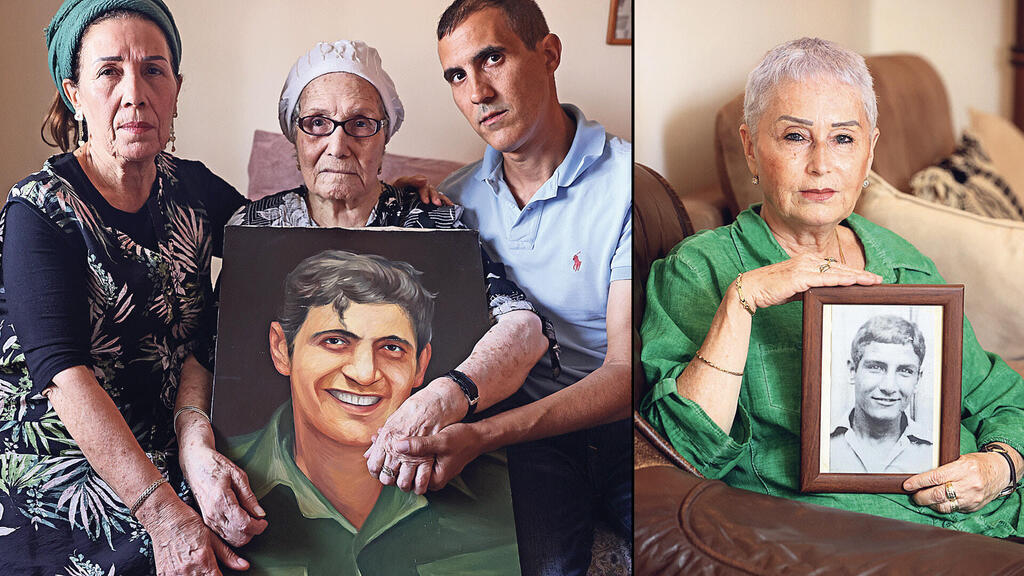

Rachel Keinan, Mazal Fahima and Roy Keinan, Moshit Greenbaum-Biton
(Photo: Gadi Kabalo, Gilad Gershgoren)
Shimon's room was even transferred in full to his mother's new apartment when she moved out of Jerusalem. The room remains empty and no one is allowed to stay there. It even contains a few coins that fell out of one of his pockets, photographs and an old phone.
Rachel's son Roy had served in the Shin Bet and the professional experience he gained there helped in the family's journey to learn more about Shimon's death. Forty-nine years after the war, they decided to visit the Golan, where he had been killed but could not even identify the exact spot or hear how he had died.
"We knew that his position came under attack and he was killed by a mortar shell. The Golani Brigade memorial site contains little information. To start our investigation, we went back to old journals that we had at home. They were from the week of mourning held for Shimon. My uncle had asked everyone who came at the time to write something that they remembered about Shimon. We did not know many of those who came and wrote and no one remained in touch with us but when we picked up the journals, we found the name Eli Mahfuda who wrote quite a bit about having been present when Shimon was killed. We decided to concentrate our efforts on tracking him down," Rachel says.
"My son Roy said he believed Eli was living in the US. but had not spoken to him in 40 years. We looked online but did not find anyone by that name. But to our surprise, someone said he had written on the Defense Ministry website. At least we had proof that Mahfuda was real and alive."
Tracking Mahfuda down turned out to be complicated. He had changed his first name to Eliot. "We did however discover that he was not the only one to write on the Defense Ministry site. David Biton's sister-in-law Moshit Greenbaum-Biton, also wrote a post and the family tracked her down through mutual Facebook friends. She could tell the family about how close the two friends were and had also involved military historian Moshe Givati who included their story in a book.
Greenbaum-Biton never met David. He was killed before she met her husband, who was his older brother and was one among the 13 of his family's children. "My husband was very attached to David who was the youngest of all the siblings," she says.
"He would talk about him all the time. I too served in the Golani Brigade and when I learned of David's story, I drove my commanders crazy, asking for information." Over the years, she found a photograph of David and Shimon but not much else and there was no contact between their families. Every year I write a post remembering David and his friend Shimon.
The search continued and the younger members of the Fahima family decided to turn to a Facebook community where people search for long-lost friends, and although many people reached out, there was no viable lead.
"It was like gathering pixels together to make one picture"
"It was painstaking work. Like gathering pixels together to try and end up with a picture. I crossed reference information and with the help of someone, I found another Facebook page called The Yom Kippur War – Memories, Scars, Pain and All the Rest and that is where I found more posts, this time from Eliot Mahfuda. The age was right so I left messages for him and for his children in Hebrew and in English," he says.
"Then, on a Sunday morning, I saw a message on my phone from Mahfuda's daughter telling me her dad had tears in his eyes when she told him that we were looking for him. I learned that he had graduated from the Technion in Haifa, had moved to the U.S. where he started a farming machine business and later became a communications consultant.
"I moved to the U.S. in 1980 after graduation," he says from his home in New York where he lives with his wife after a long and successful career. He has four children but has never forgotten the war. "It took years to get over that time. I would have night terrors," he says.
Mahfuda's integration into the U.S. was smooth. In Israel, he felt that he was held back by his Sephardi origins and was not taken seriously. Even years later, when he would visit, he would hear comments from friends and acquaintances about it despite having earned a degree in engineering from a reputable university.
He remembers when his two friends were killed like it was yesterday. They had asked him to pray with them on that Yom Kippur morning when they were on routine duty on the Syrian border. "We prayed and sang in the Moroccan tradition we all knew and then another member of our battalion, who had always complained and said he wanted to leave the deployment, ran to us from one of the positions and said he saw movement on the other side.
"At first, we did not take him seriously but then two choppers with Arabic writing on them flew overhead. We radioed in but were told that they were ours and that all was quiet. We asked to return to base and were given the go-ahead although the fighting had already begun and we were not informed. We walked right into the thick of things."
Roy continues the story adding details he later learned from other sources. "They were six men in the APC. A driver, that no one could identify; Mahfuda, who was the medic; the two friends David Biton and Shimon Fahima; David Leventhal the CO and a guy called Levi Aziz. They sat without putting their flak jackets on and their guns were put to their sides as they drove to base where they expected to break the fast. They are unaware that frontline positions had been under attack for the past two hours."
"An RPG hit the vehicle as they slowed down at a bend in the road. The driver and Aziz who was next to him were killed on the spot from the shrapnel. The rest, some injured, jumped out. We know from the records that Shimon and David were found side by side, facing the direction of the enemy forces with their fighting gear on them. They were not killed from the explosion but died fighting the invading force."
Mahfuda remembers their last words. "We will get to the base and recite the Ne'ila prayer." He goes on. "What hurts most is fate. As a medic, I would usually sit by the driver, but Aziz asked me to sit in the back this time and I agreed. He took the first round of fire."
What happened after you were thrown out of the APC?
"I was in shock trying to return fire. I came out on the left side of the vehicle and rolled over. I felt a warmth in my chest. I had been shot. I heard screams for a medic but could not help. I just kept my finger in the hole in my chest." Roy adds that he supposes Shimon and David geared up and returned fire.
Why do you think it took 50 years to hear this story? To hear that they were not killed at the base?
"I think everyone was traumatized. Mahfudah went to visit Aziz's family and his mother asked why God had chosen to keep him alive and not her son. That probably resonated with him and he felt guilty that as a medic, he was unable to save the others."
Mahfuda is still angry to this day. "I think our commanders said 'let's send them there to help out,' without telling us what was going on and with the hope that we would encounter the Syrians and show them. That was colossal stupidity. Idiotic naiveite. Those who knew and kept us in the dark should be made to pay."
Why do you think they were killed, and the others were not?
"Because while the others took cover in a ditch, they went out to engage the enemy. The Syrians did not advance, they had probably gotten lost on their way to the Hermon post and were retreating. I think the fire they took made them turn back. Shimon and David probably saved the others by their actions. What they did was heroic but to me, Shimon was a hero even before. After my own military service and my work in the Shin Bet, I know that what they did was exceptional. Not everyone would do what they did."
Roy's mother sees things differently. She had comfort in the belief that her brother had died quickly. "Now I cannot stop thinking about him lying there hurt," she says. "I can't help thinking what was going through his mind. Was he thinking about the family? His life? It is a difficult feeling to have. I stay away from stories of the war. I refuse to see films or participate in memorial services. The pain is too great. Today I live alongside the story but I am still afraid to touch it."
Military historian Givati, who himself was a commander and fighter on the Golan during the war, insists his record as it was presented in his book is accurate. He spent six years researching the fighting and although he did not interview Mahfuda, he refuses to accept his version of events. "My work is published. People can do what they like with it," he says.
In his book, he writes that the force was called back from their assignment to join the fight. On the way, they encountered a Syrian force and three were killed and three others injured in the gunfight. It took rescue forces hours to get to them.
Givati says there are thousands of cases that still remain unclear. He blames the fog of war. "Even I, after six years of research, still do not have answers."
WHERE ISRAEL STANDS NOW 50 YEARS ON - AMIR AVIVI
(ILTV)


